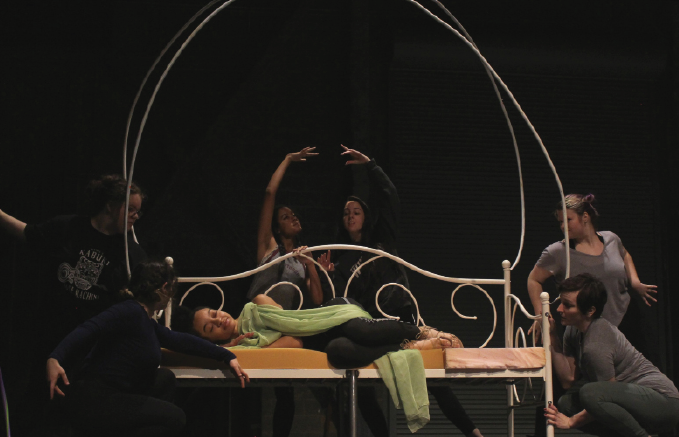This story originally appeared at The Palmetto Report which can be found at palmettoreport.com
Shakespeare is often a point of tension for many current and former students who had to sit through classes deciphering the difficult words and phrases that the Bard is famous for, but the Winthrop University Theatre Department wants to change that stigma with their rendition of “A Midsummer Night’s Dream,” one of Shakespeare’s most famous comedies.
Sarah Provencal, the director of the production and a Winthrop Theatre and Dance faculty member, said that one of her main goals with the performance is to make it so anyone can understand it.
“So many people that enjoyed [Shakespeare’s] plays the most when they were performed during his lifetime were people that didn’t necessarily get all the language, they just enjoyed the really hilarious physical comedy and the truthfulness of the characters. When you come, you’re not going to understand every single word the first time you see it but you’ll get the story because the way we are staging it is highly physical, highly energetic. Even if you didn’t speak English you could watch this production and you would still know what’s going on and could have a good time watching it,” Provencal said.
“A Midsummer Night’s Dream” follows four main plots, which makes it stand out among other Shakespeare plays.
In one plot, characters Thesueus and Hippolyta plan their marriage. Another plot follows the four lovers Hermia, Helena, Demitrius and Lysander as they navigate their love for each other as Lysander and Hermia love each other, but Helena loves Demetrius while Demetrius loves Hermia.
Meanwhile, the third plot follows the rude mechanicals which is a theatre troupe made up of six laborers and the fourth plot follows the fairies who attend to Oberon the king of the faeries and Titania the queen of the fairies as they interfere with the lovers.
Ever since middle school, Emily O’Regan, who is cast as Demetrius, said she has considered “A Midsummer Night’s Dream” to be her favorite Shakespeare play, and when seeing it listed as one of the 2020 plays she was “ecstatic.” In order to prepare for and perfect her role, she picked her monologue in May and practiced over the entire summer to prepare for auditions in the fall.
“To make a Shakespeare play really good, it needs to be really physical and dramatic and over the top and comedic, so I really like those different aspects. This show has a lot of magic involved and some of the stuff that happens in it doesn’t make sense and that’s what makes it so fun. There’s parts where we sleep out in the woods sometimes and fairies bring us little pillows, which is funny, having that happen on stage,” O’Regan said.
Allyson Baumgartner will portray Hermia on stage, a role that she considers “a dream role.”
“She’s super feisty, she’s been very sheltered in her life, because she is upper class, so her dad kind of shelters her and uses her as a pawn in his life. But she’s turning rebellious and the whole story is sparked by her rebellion.” Baumgartner said.
Winthrop’s production of this show has a sense of uniqueness as the cast is largely women, with several roles historically played by men being played by women. Provencal said this is mostly due to the large female population in the theatre department, but also because she said she felt it important to give the role to the best person for the part, regardless of gender.
“A lot of times, we end up doing these shows that have a fifty-fifty male-female cast ratio which sounds equal, but it’s not equitable when you think about the makeup of gender of our students. So basically we wanted to just give the roles to the best actors for the part regardless of what sex they were assigned at birth. Midsummer was a nice vehicle to do that with because it is a comedy and so there is already some gender play happening anyway in the play so we just added that next layer on. For Shakespeare, his plays were originally performed with all males because it was illegal for females to perform so it’s not that crazy to have some cross gender casting,” Provencal said.
But above all else, Baumgartner said their main goal is to provide the audience with the story, transcending the style of language that is commonplace in Shakespeare’s works that tends to leave some readers confused.
“Shakespeare is it’s own beast, but Shakespeare creates this incredible road map for us to use, he has this iambic pentameter and this verse that the lovers use… and movement is such an important part of Shakespeare as well. Shakespeare would be super boring if you just stood and talked. [Provencal] has created this awesome dynamic of moving within the piece that makes Shakespeare so much more interesting and it helps people that don’t understand Shakespeare actually get it. The actors will guide the audience. Yes, it does take a second to get used to but it’s a story that you can follow along. Us as actors we are giving the audience the story and as long as the audience understands the story, the language is just like the icing and sprinkles on top of the cupcake,” Baumgartner said.
Provencal said she considers “A Midsummer Night’s Dream” to be Shakespeare’s best comedy.
“I think if you like laughing, that you’ll like this show. You don’t have to know how to do iambic pentameter, you don’t have to have visited the globe theater before. If you think that humans can be over dramatic and you think that’s fun, then come see it because it’s a lot about the drama of love and lust and how ridiculous love can be,” Provencal said.
Opening night of the performance is Feb. 19 and will run through Feb. 22. Tickets are $8 with a Winthrop ID and $15 to the general public.
Photo: Téa Franco/ The Palmetto Report




